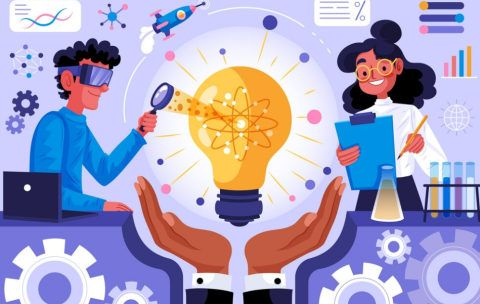Popular Instructors
All Case Studies and Practical Insights Courses
Strategic Communication and Influence
Strategic Communication and Influence are essential skills for MBA students, …
What you'll learn
Module 1: Essentials of Strategic Communication (4 hours)
Session 1.1: Foundations of Strategic Communication (2 hours)
Introduction to strategic communication: concepts and importance.
Role of strategic communication in business and leadership.
Session 1.2: Crafting Effective Messages (2 hours)
Developing clear, persuasive communication strategies.
Tailoring messages to different audiences and channels.
Module 2: Principles of Influence and Persuasion (4 hours)
Session 2.1: Art of Persuasion (2 hours)
Theories and techniques of persuasion.
Ethical considerations in persuasive communication.
Session 2.2: Persuasive Storytelling (2 hours)
Utilizing storytelling as a powerful tool for influence.
Crafting and delivering compelling narratives.
Module 3: Communication Channels and Media (4 hours)
Session 3.1: Effective Use of Communication Channels (2 hours)
Selecting and utilizing appropriate communication channels.
Digital and social media strategies.
Session 3.2: Media Relations and Public Speaking (2 hours)
Engaging with the media effectively.
Developing public speaking and presentation skills.
Module 4: Organizational Communication (4 hours)
Session 4.1: Internal Communication Strategies (2 hours)
Enhancing internal communication within organizations.
Building and sustaining a positive organizational culture.
Session 4.2: Crisis Communication Management (2 hours)
Strategies for effective communication during crises.
Case studies on crisis communication.
Module 5: Practical Application and Case Studies (4 hours)
Session 5.1: Developing a Strategic Communication Plan (2 hours)
Workshop on creating a strategic communication plan.
Real-world case study analysis and discussions.
Session 5.2: Role-Playing and Simulations (2 hours)
Interactive exercises in strategic communication and influence.
Practicing negotiation and persuasive techniques.
Project Management and Team Collaboration
Project Management and Team Collaboration are integral skills for MBA …
What you'll learn
Module 1: Project Management Fundamentals (4 hours)
Session 1.1: Introduction to Project Management (2 hours)
Key concepts, methodologies, and life cycle of project management.
Understanding project scope, timeline, and resource allocation.
Session 1.2: Project Planning and Execution (2 hours)
Tools and techniques for effective project planning.
Execution strategies and managing project deliverables.
Module 2: Team Collaboration and Dynamics (4 hours)
Session 2.1: Building Effective Teams (2 hours)
Principles of forming, storming, norming, and performing in teams.
Building trust and effective communication within teams.
Session 2.2: Collaborative Tools and Techniques (2 hours)
Leveraging technology for team collaboration.
Techniques for remote and virtual team collaboration.
Module 3: Risk Management and Problem Solving (4 hours)
Session 3.1: Identifying and Managing Project Risks (2 hours)
Techniques for risk identification and assessment.
Developing risk mitigation and contingency plans.
Session 3.2: Creative Problem-Solving in Projects (2 hours)
Applying creative thinking to solve project challenges.
Case studies on innovative problem-solving in projects.
Module 4: Leadership and Communication in Projects (4 hours)
Session 4.1: Leadership Skills for Project Managers (2 hours)
Leading projects effectively: leadership styles and skills.
Motivating and inspiring project teams.
Session 4.2: Effective Communication in Projects (2 hours)
Importance of clear and consistent communication.
Communication strategies with stakeholders and team members.
Module 5: Practical Application and Case Studies (4 hours)
Session 5.1: Project Management Simulation (2 hours)
Hands-on project management simulation exercises.
Real-world application of project management skills.
Session 5.2: Analyzing Project Management Case Studies (2 hours)
Discussion and analysis of successful and failed projects.
Lessons learned and best practices.
Negotiation and Conflict Resolution
Negotiation and Conflict Resolution are essential skills in the business …
What you'll learn
Module 1: Essentials of Negotiation (4 hours)
Session 1.1: Fundamentals of Negotiation (2 hours)
Understanding negotiation principles and stages.
Differentiating between various negotiation styles and approaches.
Session 1.2: Preparing for Negotiations (2 hours)
Importance of preparation and strategy in negotiation.
Role-playing exercises on negotiation preparation.
Module 2: Advanced Negotiation Techniques (4 hours)
Session 2.1: Psychological Aspects of Negotiation (2 hours)
Leveraging psychological principles in negotiation.
Handling emotions and biases in negotiation.
Session 2.2: Complex Negotiation Scenarios (2 hours)
Navigating multi-party and high-stakes negotiations.
Case studies on complex negotiation scenarios.
Module 3: Understanding and Managing Conflict (4 hours)
Session 3.1: Dynamics of Conflict (2 hours)
Types and sources of conflict in organizational settings.
Techniques for conflict analysis and understanding.
Session 3.2: Conflict Resolution Strategies (2 hours)
Effective strategies and models for conflict resolution.
Role-playing scenarios for applying conflict resolution skills.
Module 4: Communication in Negotiation and Conflict (4 hours)
Session 4.1: Communication Skills for Negotiation and Conflict (2 hours)
Role of effective communication in negotiation and conflict resolution.
Developing active listening and assertive communication skills.
Session 4.2: Negotiation and Conflict Resolution in Diverse Cultures (2 hours)
Cross-cultural considerations in negotiation and conflict resolution.
Case studies on cross-cultural negotiation challenges.
Module 5: Practical Application and Case Studies (4 hours)
Session 5.1: Negotiation Simulations (2 hours)
Engaging in simulated negotiation exercises.
Analysis and feedback on negotiation outcomes.
Session 5.2: Conflict Resolution Workshops (2 hours)
Workshops on practical conflict resolution techniques.
Group activities and discussions on real-world conflict scenarios.
Leadership in Diverse and Global Environments
Leadership in diverse and global environments is increasingly crucial in …
What you'll learn
Module 1: Global Leadership Foundations (4 hours)
Session 1.1: Global Leadership Concepts (2 hours)
Understanding the essence of leadership in a global context.
Differentiating between traditional and global leadership styles.
Session 1.2: Cultural Intelligence in Leadership (2 hours)
Developing cultural intelligence (CQ) for effective global leadership.
Strategies for understanding and adapting to diverse cultural norms.
Module 2: Leading Diverse Teams (4 hours)
Session 2.1: Dynamics of Multicultural Teams (2 hours)
Challenges and opportunities in leading diverse teams.
Techniques for building and managing multicultural teams.
Session 2.2: Inclusive Leadership (2 hours)
Principles of inclusive leadership in a global environment.
Fostering a culture of diversity and inclusion.
Module 3: Cross-Cultural Communication and Negotiation (4 hours)
Session 3.1: Effective Cross-Cultural Communication (2 hours)
Overcoming communication barriers in a global setting.
Tailoring communication strategies to diverse audiences.
Session 3.2: Cross-Cultural Negotiation Skills (2 hours)
Techniques for successful negotiation in various cultural contexts.
Case studies on international negotiation scenarios.
Module 4: Ethical Leadership and Global Ethics (4 hours)
Session 4.1: Ethics in Global Leadership (2 hours)
Navigating ethical dilemmas in a global environment.
Balancing global and local ethical considerations.
Session 4.2: Corporate Social Responsibility Internationally (2 hours)
Role of CSR in global leadership.
Strategies for implementing CSR in diverse regions.
Module 5: Case Studies and Leadership Challenges (4 hours)
Session 5.1: Analyzing Global Leadership Case Studies (2 hours)
Examination of real-world global leadership challenges and solutions.
Discussion on strategies for successful global leadership.
Session 5.2: Leadership Simulation Exercise (2 hours)
Interactive leadership simulations in a global context.
Application of learned concepts to practical scenarios.
Innovation Management and Creative Problem-Solving
Innovation Management and Creative Problem-Solving are critical competencies in today’s …
What you'll learn
Module 1: Foundations of Innovation (4 hours)
Session 1.1: Introduction to Innovation Management (2 hours)
Understanding the concept of innovation in business.
Differentiating between types of innovation: incremental, radical, and disruptive.
Session 1.2: The Innovation Process (2 hours)
Stages of the innovation process from ideation to implementation.
Challenges and best practices in managing innovation.
Module 2: Tools and Techniques for Creative Thinking (4 hours)
Session 2.1: Creative Thinking Strategies (2 hours)
Techniques to foster creativity and ideation, such as brainstorming and mind mapping.
Overcoming barriers to creative thinking.
Session 2.2: Design Thinking and User-Centric Innovation (2 hours)
Principles of design thinking.
Applying design thinking to solve business problems.
Module 3: Leading and Organizing for Innovation (4 hours)
Session 3.1: Leadership in Innovation (2 hours)
Roles and responsibilities of leaders in fostering an innovation culture.
Leading and managing creative teams.
Session 3.2: Organizational Structures Supporting Innovation (2 hours)
Analyzing different organizational models that encourage innovation.
Case studies on successful innovation management in organizations.
Module 4: Practical Application of Innovation Strategies (4 hours)
Session 4.1: Innovation Project Management (2 hours)
Tools and techniques for managing innovation projects.
Balancing creativity with practical implementation.
Session 4.2: Measuring and Sustaining Innovation (2 hours)
Metrics for evaluating innovation success.
Strategies for maintaining a sustainable innovation pipeline.
Module 5: Case Studies and Problem-Solving Workshops (4 hours)
Session 5.1: Analyzing Innovation Case Studies (2 hours)
Examination of real-world cases of successful and failed innovations.
Lessons learned and key takeaways.
Session 5.2: Creative Problem-Solving Workshop (2 hours)
Hands-on workshop to apply creative problem-solving skills.
Group activities and peer feedback.
Emotional Intelligence and Interpersonal Dynamics
Emotional Intelligence (EI) and Interpersonal Dynamics are critical areas of …
What you'll learn
Module 1: Understanding Emotional Intelligence (4 hours)
Session 1.1: Fundamentals of Emotional Intelligence (EI) (2 hours)
Introduction to EI concepts and components.
The significance of EI in personal and professional success.
Session 1.2: Self-Awareness and Self-Regulation (2 hours)
Tools and strategies for enhancing self-awareness.
Techniques for managing emotions and impulses.
Module 2: Social Awareness and Relationship Management (4 hours)
Session 2.1: Empathy and Organizational Awareness (2 hours)
Developing empathy and understanding social cues.
Navigating organizational dynamics with emotional intelligence.
Session 2.2: Building and Sustaining Relationships (2 hours)
Strategies for effective relationship management.
Handling conflicts and negotiations with emotional intelligence.
Module 3: Communication Skills and EI (4 hours)
Session 3.1: Emotionally Intelligent Communication (2 hours)
Principles of effective verbal and non-verbal communication.
Active listening and empathetic response techniques.
Session 3.2: Influence and Persuasion in Communication (2 hours)
Utilizing EI in persuasive communication and influence.
Case studies and role-playing exercises.
Module 4: Leadership and Team Dynamics (4 hours)
Session 4.1: EI in Leadership (2 hours)
Role of EI in effective leadership.
Fostering a positive emotional climate in teams.
Session 4.2: Team Dynamics and EI (2 hours)
Managing diverse teams with emotional intelligence.
Promoting collaboration and resolving team conflicts.
Module 5: Practical Application and Case Studies (4 hours)
Session 5.1: EI Assessment and Personal Development Plan (2 hours)
EI self-assessment exercises.
Developing a personalized EI improvement plan.
Session 5.2: Analyzing EI in Real-World Scenarios (2 hours)
Case studies on EI in various business contexts.
Group discussions and application of EI concepts.
Exploring Case Studies in Research and Insight
This course aims to provide participants with a deep understanding …
What you'll learn
Understand the importance of case studies in the field of research and insight.
Analyze and interpret case studies from various industries and sectors.
Learn to extract valuable insights and lessons from real-world research projects.
Explore different research methodologies and approaches through case study examples.
Gain insights into the challenges and ethical considerations in conducting research.
Analyze the impact of research outcomes on decision-making and strategic planning.
Discuss the role of data analysis and visualization in research case studies.
Formulate strategies for designing and conducting effective research studies.
Develop critical thinking and problem-solving skills through case study analysis.
Apply the lessons learned from case studies to real-world research projects.
Deciphering Real-World Business: A Comprehensive Case Study Analysis
Welcome to “Deciphering Real-World Business: A Comprehensive Case Study Analysis,” …
What you'll learn
Develop a strong foundation in analyzing and understanding diverse business scenarios through case studies.
Enhance critical thinking and problem-solving skills in real-world business contexts.
Understand the nuances of decision-making processes in different business environments.
Learn to identify key issues, evaluate alternative solutions, and propose strategic recommendations.
Develop the ability to communicate findings and recommendations clearly and persuasively.
Cultivate a habit of continuous learning and curiosity through exposure to varied business challenges.
Gain insights into different industries, markets, and organizational cultures.
Enhance teamwork and collaborative skills through group discussions and analyses.
Build a toolkit of analytical frameworks and models applicable to various business situations.
Foster a global perspective on business challenges and opportunities.
- 1
- 2











